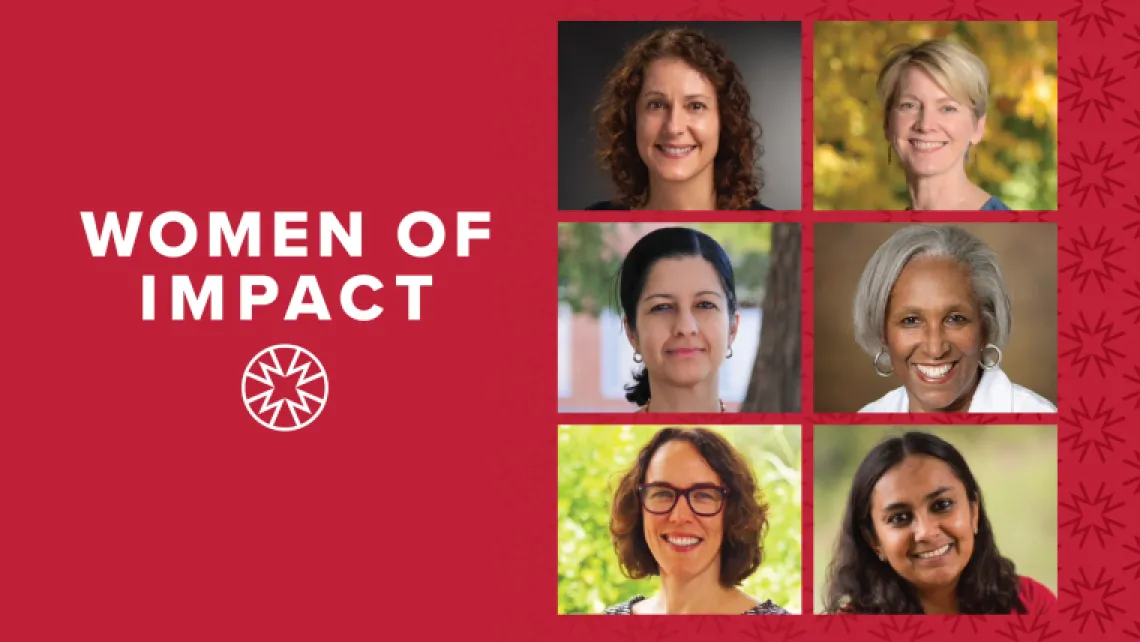Six BIO5 members named as 2023 Women of Impact
Congratulations to the 2023 Women of Impact! We are proud to have six BIO5 members recognized this year.

The Office of Research, Innovation and Impact at the University of Arizona leads an annual campaign called Women of Impact to recognize remarkable faculty and staff who have a commitment to UArizona’s purpose, mission and values. All awardees have unique skills in driving discovery and innovation, community impact, and willingness to empower others.
This year 30 impressive and forward-thinking leaders were selected from almost 200 high quality nominations across the UArizona campus. They will be celebrated online and through social media, as well at a private event on Oct. 20.
Join us in celebrating these incredible BIO5 Institute members.
Carmala “Carmie” Garzione
Dean, College of Science
Garzione is a distinguished earth scientist whose research focuses on the processes that build mountain belts and the interactions between climate and plate tectonics. In early 2023, she was named a American Association for the Advancement of Science (AAAS) Fellow, a distinct honor in the scientific community. She joined UArizona in 2021 as the dean of the College of Science, leading the development and implementation of a broad strategic vision for growing the college’s programs at all levels.
Felicia Goodrum
Interim Associate Department Head, Department of Immunobiology
College of Medicine – Tucson
Goodrum and her lab focus on understanding the molecular virus-host interactions important to human cytomegalovirus (CMV) latency and persistence in the host. Most people with healthy immune systems show no signs or symptoms associated with the virus, but it can be dangerous to immunocompromised individuals. Using her expertise on complex interaction between viruses and their host, Goodrum is part of the Aegis Consortium through UArizona Health Sciences where she collaborates with other researchers to find solutions for a pandemic-free future.
Melanie Hingle
Professor, Nutritional Sciences and Wellness
College of Agriculture, Life and Environmental Sciences
Hingle’s work lies at the intersection of nutritional sciences research and public health practice. She seeks to understand predictors and consequences of behavioral risk factors associated with obesity and type 2 diabetes. Her overall goal is to prevent these diseases and metabolic disorders, with an emphasis on youth and families. Recently, she was part of a new UArizona initiative that will use culinary medicine to help prevent and manage chronic diseases.
Juanita Merchant
Regents Professor Medicine, Division of Gastroenterology & Hepatology
College of Medicine – Tucson
As a renowned cancer research, Merchant focuses on the molecular mechanisms underlying gastrointestinal cancers. Not only recognized as a distinguished physician-scientist whose research program has been supported for 25 years by competitively awarded grants, she's an incredibly dedicated teacher and mentor. In 2022, she was appointed a Regents Professor, a title reserved for full professors whose exceptional achievements merit national and international distinction.
Sudha Ram
Anheuser-Busch Endowed Professor in Management Information Systems, Entrepreneurship & Innovation
Eller College of Management
Ram’s area of expertise includes big data analytics, machine learning, network science and business intelligence. Joining the Eller College of Management in 1985, she directs the INSITE Center for Business Intelligence and Analytics that focuses on harnessing the power of big data to help businesses and organizations make better-informed decisions. With over $60 million in research funding for her work, Ram was a speaker for TEDx and is the editor of several journals.
Gayati Vedantam
Professor, School of Animal and Comparative Biomedical Sciences
College of Agriculture, Life and Environmental Sciences
A molecular microbiologist, Vedantam and her lab study the potentially deadly Clostridium difficile (C. diff) that the Center for Disease Control estimates causes almost half a million infections in the United States each year. Using genomic and proteomic analyses, Vedantam’s translational research aims to develop safe and cost-effective non-antibiotic interventions to prevent and treat intestinal infections. She is also dedicated to training the next generation workforce through popular laboratory-based courses on bacterial pathogens and as a mentor for minority and STEM students.
